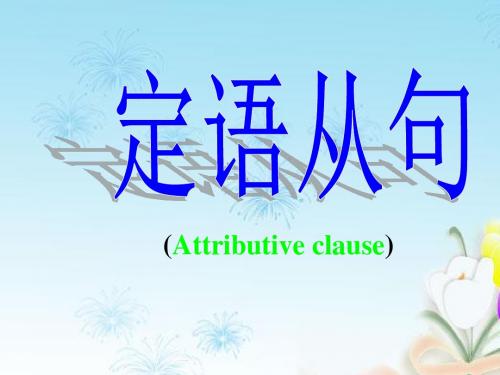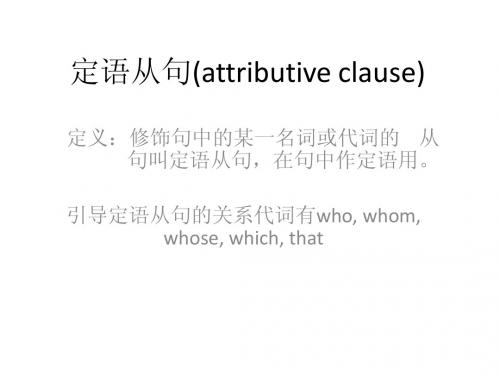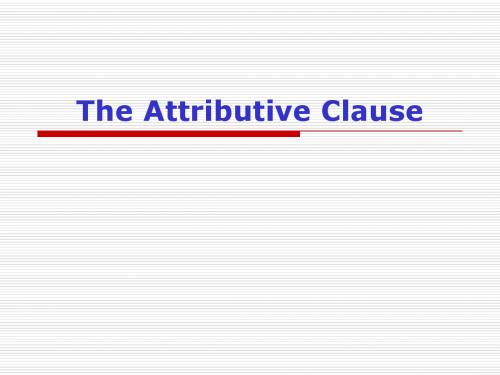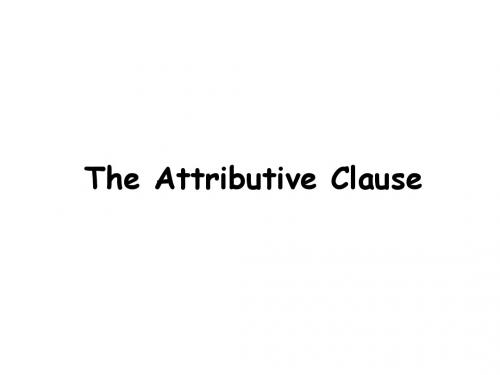Attributive Claus1
- 格式:doc
- 大小:31.00 KB
- 文档页数:7






Attributive Clause第十四单元定语从句14 1 1 定义在句子中起定语做用的从句叫做定语从句(attributive clause)英语的定义从句一般皆放在它所修饰的名(代)词之后,这一点与汉语不同。
如:The $25 billion tax cut that he (Carter) will propose is designed to revive business confidence.卡特将提出的减税二百五十亿美金的计划,目的在于恢复企业界的信心。
Anyone who chooses can apply.有意者均可申请。
I know the man you mean.我知道你说的那个人。
He is man whom everybody respects.他是一个大家都尊敬的人。
14.1 2 功用定语从句一般是修饰名词或代词的,但间或可以修饰整个句子或句子的一部分。
如:he may have acute appendicitis, in which case he will have to go hospital and operated on.他可能得了急性阑尾炎,如果是这样,他就得住院动手术。
(修饰整个句子。
)she was very patient towards the children, which her husband seldom was.她对孩子们很有耐心,她丈夫却很少这样。
(修饰句子的一部分:patient towards the children.)14 2 限制性与非限制性定语从句14.2.1限制性定语从句对于(restrictive attributive clause) 对于说明句子意义来说必要不可少,如果取消它,句子的意思就不完整,甚至会被严重歪曲。
通常不用语调或逗号把它和句子的其余部分分开。
如:A man who doesn’t know how to learn from others can’t hope to achieve much.一个不会向别人学习的人,是不能指望有多少成就的。
The man who spoke last was Dr. Johnson.最后一个发言的人是约翰逊博士。
Have you set the day when you will move?你搬迁的日子定了吗?What was it that he wanted?他到底要什么?14.2.2非限制性定语从句(non-restrictive attributive clause)对于说明句子意义来说未必不可少,与其所修身养性的成分关系不十分密切,只是对它作附加的说明;如果省略掉,剩下的部分意思仍很清楚(非限制性定语从句前面及后面一般皆有逗号以主句隔开)如She is going to spend the summer in Qingdao, where she has some friends and relatives.她打算到青岛去过夏天,在那里她有一些亲戚和朋友。
Western politicians in their messages of condolence acclaimed Zhou En-lai as one of the greatest statesmen of our ear, which undoubtedly he was.西方政治家在他们的唁电中把周恩来称为我们时代最伟大的政治家之一,毫无疑问他是当之无愧的。
Water, which is a clear liquid, has many uses.水是一种清澈的液体,它有许多用途。
14.3.1 whowho是主格,在定语从句中作主语,只可指人。
如:A professional is a person who teaches or engages in some kind of sport for money.职业运动员从事教练工作或某一项运动是要领取酬金的。
Nobody who understands the subject would say such a thing.懂得这一行的人是不会说这种话的。
14.3.2 whomwhom是宾格,在定与从句中作宾语,只可指人。
它在限制性定语从中常可省略。
如:I have just met an author (whom) I have always admired.我刚遇到一位我一直敬佩的作家。
The gentleman (whom) she met with addressed her with courtesy.她遇到的那位先生很有礼貌地和她讲话。
14.3.3 thatthat 在定语从句中既可作主语,亦可作宾语。
既可指人,亦可指物,但在当代英语里多指物,如:Is he the man that sells eggs?他是卖鸡蛋的那个人吗?(用作主语,指人。
)Water that is impure often causes serious illness.不洁的水常会引起重病。
(用作主语,指物。
)Have you got everything (that) you need?你所须要的东西都带了吗?(用作宾语,指物。
)The passengers and the suitcases that were still waiting had to be transferred to another plane.仍在等待的乘客和行礼只得改搭另一架飞机。
(这里必须用that,因为它在此既指物。
)14.3.4 whichwhich在定语从句中指物,可用作主语,亦可用作宾语(在限制性定语从句中有时可省略)。
如“She was not on the train which arrived just now.她不在刚到达的那列火车上。
(用作主语)The dog which was lost has been found.丢失的狗找到了。
(用作主语)This is the book (which) you wanted.这就是你要的那本书。
(用作宾语,可省略。
)This is the most magnificent building (which) I have ever seen.这是我看到过的最宏伟富丽的建筑。
(用作宾语,可省略。
)14.3.5. whosewhose是所有格,在定语从中用作定语,多指人,如:You’re the only one who se advice he might listen to.只有你的话他可能会听。
(用作定语,返指one,修饰名词advice.)The boys whose names were called stood up.叫到名字的男孩们站起来。
(用作定语,返指boys,修饰名词names.)Whose有时也可指物,如:I’d like a room whose windows look out over the sea.我想要一个窗户面临大海的房间。
(用作定语,返指room,修饰windows.)Whose 指物时可以用of which代替.14.3.6 asas在定语从句中可作主语,亦可用作宾语,既可指人,也可指物,如:Such people as you describe are rare nowadays.你描写的那种人现今已很少见了。
(用作宾语,指人。
)Such women as knew Tom thought he was charming.认识汤姆的妇女都认为他迷人。
(用作作主语,指人)Let’s discuss only such questions as concer n everyone of us.我们只谈与我们每个都有关的问题吧。
(用作主语,指物。
)You must show my wife the same respect as you show me.你必须像尊敬我一样地尊敬我的夫人。
(用作宾语,指物。
)14.4 定语从句中的关系副词14.4.1 whenwhen在定语从句中作时间状语,它的先行词是表示时间的名词。
如:He came at a time when I least expected him.他在我最想不到的时候来了。
(when修饰time.)-July and August are the months when the weather is cold in Newzland.七八月份是新西兰天气很冷的月份。
(when修饰months.)14.4.2 wherewhere在定语从句中作地点状语,它的先行词须是表示地点的名词。
如:I came to London, where I found him.我来到了伦敦,我在那儿见到了他。
(where修饰London.)A stone marks the spot where the treaty was signed.有一块石头标致着那个签订条约的地方。
(where修饰spot.)14.4.3 whywhy在定语从句中作原因状语,它的先行词只有reason一词。
如:Do you know the reason why I left early?你知道我为什么早走吗?(why修饰the reason.)The reason why he failed was his laziness.先行词reason如不强调,常可省去,如:That is why he came here.那就是他来这里的原因。
That’s why she spoke.那就是她为什么发言的原因。